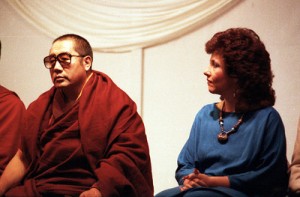An excerpt from a teaching by Jetsunma Ahkon Lhamo
Sometimes I am afraid for others, because they are following a spiritual path that is very new — perhaps 10, 20 or maybe even 100 years old — a spiritual path that was simply developed by a great thinker, great philosopher or great psychologist. Although these paths mean well, and they do produce some good — in that people who are tied up in knots get untied a little bit — I’m not sure they actually produce enlightenment, because the source is not enlightened. Even if the founders of these paths were to describe themselves as being enlightened, I would want to see if the paths actually produced enlightenment in someone following them, because there are many people who are practicing paths that have not yet produced enlightenment in one single person.
So I adopt a wait-and-see attitude. I’m really hard-nosed about that. I want something that will awaken me to my nature. I want something that will produce enlightenment. I won’t give you a dime for back rubs and affirmations and good feelings because those things have not proved to me that they will produce enlightenment. I want what works.
I’m not saying there’s only one path, and that’s the Buddha’s path. I’m not saying that another path could not be revealed. I’m not saying that no one else has the answer. I am saying that if I’m going to travel across the ocean of suffering, I’m going to do it in a boat with no holes. I know that I want to practice a path that has as its source the mind of enlightenment, and I also want to practice a path that has produced enlightenment in many other sentient beings. That, to me, is a boat with no holes. You’re not going to catch me — I’m a very, very practical person — leaving shore in a boat with holes. That’s not going to happen; I’m too much of a coward.
And in my having the special joy that I feel, the most happy part is that somehow I seem to have the karma of being in the position to help propagate this path. Now believe me, I have no idea how that happened. I’m just happy that it is so. If I have the opportunity to do anyone some good, if I have the opportunity to afford someone a place to be comfortable and to be trained and to feel at home so that they can practice such a path, then I’m really happy about my life.
So, when someone says to me, “I don’t know how to deal with your change to Buddhism,” I can only say, “Don’t even bother, because you have enough to deal with already. You have to deal with cyclic existence. You’re a busy person. What you need to think about is not what I’m doing. You need to think about how you are going to achieve enlightenment. How are you going to liberate your mind from the very conceptualizations that you are expressing to me right now? How are you going to free yourself from the rigidity and the restriction, the confines of your own feelings, that run you around the block the way they do and never produce enlightenment? That’s your problem, and it’s not my job to worry about it.”
My job is to do what I am doing now. I hope to do it better and better. But this path isn’t all about me; it’s about awakening. And so I really don’t waste a lot of time thinking about how I feel or how you feel or what feelings are all about. I mostly try to rest my mind in something that is like calm abiding, because the Buddha didn’t teach me to worry. He didn’t teach me to have preconceived ideas, he didn’t teach me to be rigid, and he didn’t teach me to have lots of ideas about things. He taught me to realize the nature. And at the core of every experience, including my feelings or yours, is that nature. And it is my intention to spend the rest of my life accomplishing the full awakening to that nature and dispelling attachment to everything else.
So, you see, I am not a convert to the Buddha’s teaching. I am simply one who wishes to cross the ocean of suffering and to take everyone with me. I simply want to experience the end of suffering, and I want everyone else to have that experience too. If that makes me a Buddhist, then I am a Buddhist.
© Jetsunma Ahkön Lhamo

